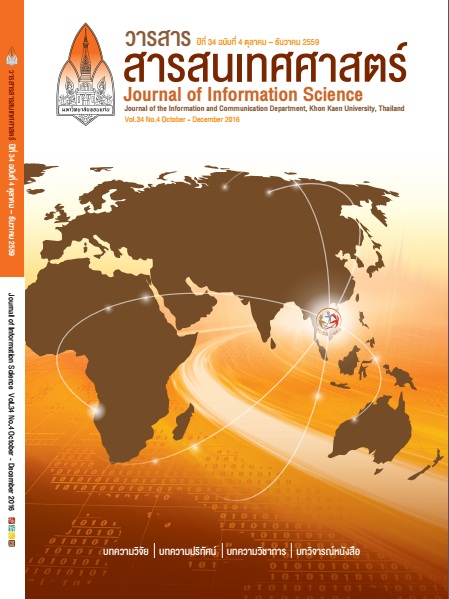การประเมินการรู้ดิจิทัลของนักศึกษาระดับปริญญาตรีในเขต กรุงเทพมหานครและปริมณฑล
Keywords:
การรู้ดิจิทัล, การประเมินการรู้ดิจิทัล, องค์ประกอบการรู้ดิจิทัล, นักศึกษาระดับปริญาตรี, Digital literacy, Digital literacy assessment, Digital literacy factors, Undergraduate studentsAbstract
บทคัดย่อ
การวิจัยครั้งนี้มีวัตถุประสงค์เพื่อประเมินระดับการรู้ดิจิทัลของนักศึกษาระดับปริญญาตรี และเปรียบเทียบการรู้ดิจิทัลของนักศึกษาระดับปริญญาตรีโดยรวมและรายองค์ประกอบตามตัวแปรคุณลักษณะส่วนบุคคล (เพศ กลุ่มสาขาวิชา ระดับชั้นปี การศึกษาสูงสุดของบิดา/มารดา รายได้รวมของบิดาและมารดา) และประเภทมหาวิทยาลัย โดยใช้วิธีวิจัยเชิงปริมาณ เครื่องมือที่ใช้ในการวิจัย คือ แบบวัดการรู้ดิจิทัล เก็บรวบรวมข้อมูลจากกลุ่มตัวอย่างที่เป็นนักศึกษาระดับปริญญาตรีของมหาวิทยาลัยในเขตกรุงเทพมหานครและปริมณฑล 14 แห่ง จำนวน 1,183 คน วิเคราะห์ข้อมูลโดยสถิติเชิงพรรณา และเปรียบเทียบกลุ่มตัวอย่างสองกลุ่มที่เป็นอิสระกัน (Independent-samples t-test) วิเคราะห์ความแปรปรวนทางเดียว (One - way ANOVA) และวิเคราะห์เปรียบเทียบความแตกต่างรายคู่ (Post hoc comparison) ด้วยวิธีการวิเคราะห์ของเชฟเฟ่และดันเน็ทท์ ที3 ผลการวิจัยพบว่านักศึกษาระดับปริญญาตรีมีการรู้ดิจิทัลในระดับมาก องค์ประกอบที่มีค่าเฉลี่ยสูงสุดและอยู่ในระดับมาก คือ ทักษะการตระหนักรู้ รองลงมา คือ ทักษะการร่วมมือ และทักษะการคิด ตามลำดับ ส่วนทักษะการปฏิบัติอยู่ในระดับปานกลาง เมื่อเปรียบเทียบการรู้ดิจิทัลกับตัวแปรคุณลักษณส่วนบุคคลและประเภทมหาวิทยาลัยพบว่า นักศึกษาที่มีเพศ ระดับชั้นปีและสังกัดประเภทของมหาวิทยาลัยที่แตกต่างกัน มีการรู้ดิจิทัลไม่แตกต่างกัน แต่นักศึกษาที่บิดา/มารดามีการศึกษาสูงสุด และรายได้รวมของบิดาและมารดาแตกต่างกัน มีการรู้ดิจิทัลแตกต่างกัน
Abstract
This quantitative study aimed at assessing the digital literacy of 1,183 undergraduate students in 14 universities in Bangkok and its vicinity and comparing their digital literacy based on personal variables (gender, majors, year, parents’ education, household income) and types of universities. The digital literacy assessment papers were used for collecting data which were later analyzed using descriptive statistics and compared by independent-samples t-test, One-way ANOVA and post hoc comparison with Scheffe’s method and Dunnett’s T3. The findings disclosed that the undergraduate students were digital literates at the high level. The highest mean among the digital literacy skills was the realization of information needs followed by the collaboration and thinking skills respectively, while the operating skills (searching, evaluating and using digital information skills) were reportedly at the moderate level. The comparison of the personal variables and types of the universities revealed that the students’ genders, years of study and types of the universities did not impact their digital literacy awareness, however, the students whose parents were educated and had high income earnings were better digital literates.








